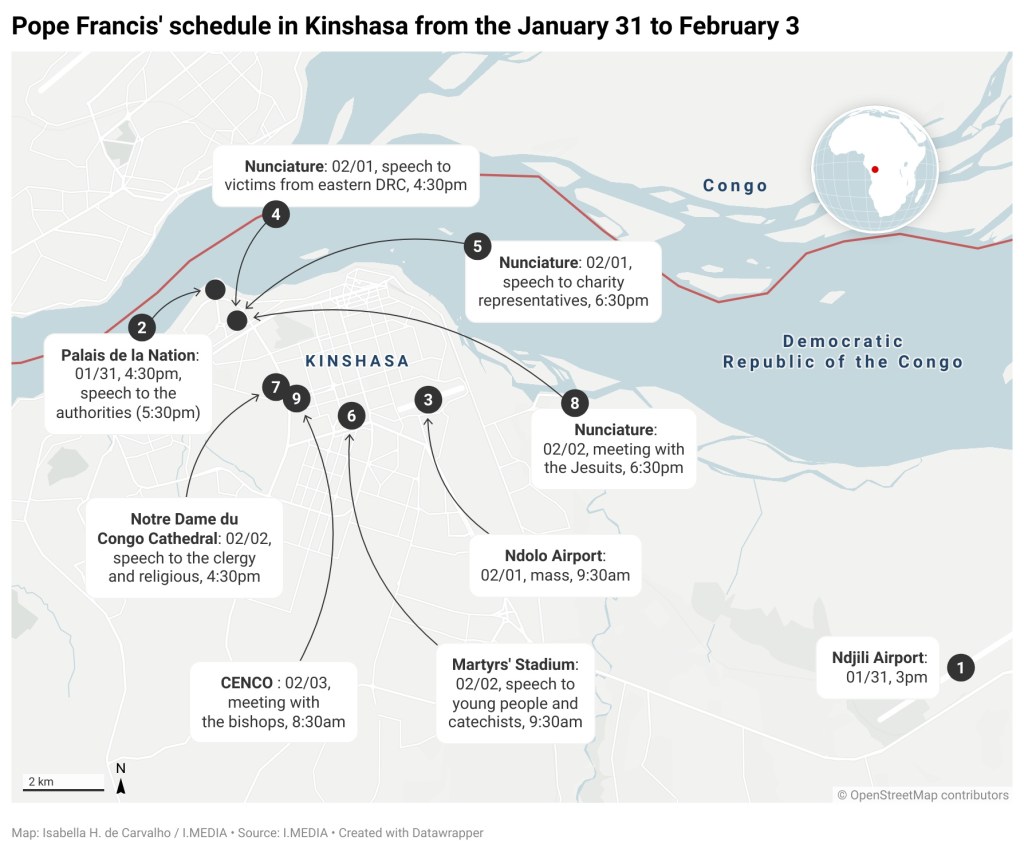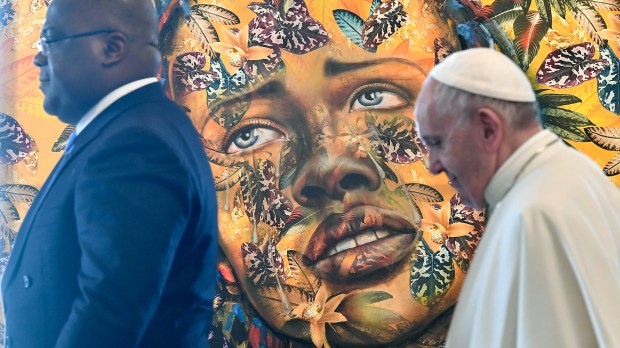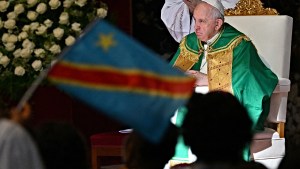For his 40th foreign trip since 2013, the Pope is visiting the Democratic Republic of Congo and South Sudan from January 31 to February 5. In a DRC ravaged by conflict, the Pope alerts people’s consciences to the tragedies taking place in the east of the country. His trip is also an opportunity to encourage the largest Catholic country in Africa, a continent where evangelical Christians are on the rise.
“I ask for your forgiveness.“ On June 12, 2022, in front of a crowded St. Peter’s Square, the Pope spoke from the window of the Apostolic Palace on the occasion of the Sunday Angelus. Two days earlier, the Holy See had announced the cancellation of the trip to the DRC and South Sudan planned for July. Officially, it was so that the Pope would not “compromise the results of the knee therapies still in progress.” But it was also because of the security situation in the east of the DRC that the organizers of the trip made the decision to postpone the trip sine die.
This was painful for the Pope, who insisted on rescheduling the trip quickly to honor a country of more than 105 million people, half of whom are Catholic. “This beginning of 2023 was the last possible window for him to come since elections are expected at the end of the year, and the Holy See does not want to influence their course, nor be instrumentalized,” says a diplomatic source who puts this trip in the same category as the great trips of Francis in Iraq in 2021 or in Central African Republic in 2015.
On the eve of this trip, Cardinal Secretary of State Pietro Parolin, the equivalent of the Pope’s Prime Minister, said that the Pontiff was flying to Africa as a “pilgrim of peace and reconciliation.”
The DRC is suffering from endemic poverty – the former Belgian colony was ranked 175th out of 189 in the United Nations’ 2020 Human Development Index. And the security situation is just as critical, especially in the east of the country, where the Pope initially wanted to visit.

A diocese cut in two by war
“The site where the Pope was to celebrate Mass last July is now on the front line,” said Bishop Willy Ngumbi of Goma. For several months, his diocese has been cut in two, with one part now in the hands of the M23 rebels, a powerful armed group formed in March 2009 and composed mainly of Rwandophones (Kinyarwanda speakers) from northern Congo who accuse the DRC of marginalizing their Tutsi minority.
The mineral-rich region is prey to dozens of militias that thrive on ethnic and economic interests. “Villages, schools, medical facilities… the ADF/MTM rebels [Allied Democratic Forces, aka Madina at-Tauheed, a group that some affiliate with the Islamic State, Ed.] kill with machetes, loot property, and take with them children, young people, adults, women and men to transport the looted goods… Then they burn down houses and other property before retreating,” describes Bishop Melchisédech Sikuli of the Diocese of Butembo-Beni, also in North Kivu.
Behind these heavily armed militias are also the interests of neighboring powers. “Rwanda has a gold exchange… However, Rwanda does not produce a gram of gold on its territory,” says a diplomat, horrified by all the tragedies that are taking place in the eastern DRC. “We can say there have been millions of deaths over the past 30 years. It’s abominable… And what’s incredible is that this is happening with the greatest indifference,” he laments, seeing the Pope’s visit as an opportunity to alert people’s consciences.
Having had to give up his trip to North Kivu, the 86-year-old Pope personally wanted to meet with victims of eastern Congo in Kinshasa, the capital, where he will spend three nights. This will be one of the highlights of the trip. “There will be young girls who have been abused, taken into the forests by rebels to be like sex slaves,” said Bishop Willy Ngumbi, who will also accompany former child soldiers, others who were forced to work in the mines, and victims of the volcanic eruption of May 2021 that hit the Goma region.
In his speeches, which some predict will be “hair-raising,” the Pope is expected to raise a cry for peace. But he could also once again criticize the West’s attitude towards the exploitation of natural resources in Africa. In an extensive interview with Mundo Negro, the magazine of the Comboni congregation, the Pope already denounced in mid-January the persistence of a colonial mentality regarding Africa. A few days later, he spoke in the columns of the AP agency explaining that the African countries had certainly obtained independence of the soil, but “the subsoil was left in the hands of the colonizers who arrived later.”
Encouraging the largest Catholic country in Africa
The day after his arrival in the DRC, Pope Francis is expected to celebrate Mass before more than a million faithful gathered on the tarmac of Kinshasa airport. It will be a moment of joy for a country where nearly 50 million Catholics live, that is to say 20% of the Catholics of the African continent. The biggest French-speaking Catholic country in the world, this immense territory saw the arrival of the first Portuguese missionaries at the very end of the 15th century.
The Church’s presence has intensified over the centuries and today the institution has a unique network of health and educational infrastructure. It manages nearly a third of the country’s public schools and 40% of its health establishments, according to the Congo Study Group. This position allows it to compensate as much as possible for the shortcomings of the public authorities. “In the DRC, when the state is not there, the church steps in,” says a Congolese Jesuit.
In this country, which gained independence in 1960, the Church has also regularly stepped up to the plate to defend the rule of law in the face of successive authoritarian powers. In 2015, the DRC’s powerful episcopal conference, CENCO, threw itself into the battle for a democratic transition after 15 years of Kabila’s rule. Having secured – with the help of the massive mobilization of thousands of lay people – the holding of elections at the end of 2018, it then deployed 40,000 observers across the territory to ensure the smooth running of the vote.
But the outcome of the vote escaped the institution, which initially did not recognize the election of Felix Tshisekedi as president, ensuring that the real winner was Martin Fayulu. The archbishop of Kinshasa, the future cardinal Fridolin Ambongo, condemned a “denial of the truth,” considering that Kabila had in fact designated Felix Tshisekedi as his successor.
To avoid paralysis and seeing the great Western powers recognize Tshisekedi, the DRC bishops finally accepted the arrival of the new president. Thanks to this failure, some didn’t hesitate to say that the Church in the DRC had authority but little power. With elections looming at the end of the year, some want Pope Francis to deliver a clear message.
“We’re waiting for him to remind us that the elections must be free and transparent, without corruption or trafficking,” said Bishop Willy Ngumbi. But others are more skeptical about the Pope’s ability to make such an appeal. “It would be to discredit the current president, who was not recognized at first by the clergy… However, time has passed and the Church and the government are now trying to be constructive because the challenges are so great,” said a diplomat.
The Pope will also have to find the right words to encourage a Catholic Church that is strongly challenged by the rise of evangelical Christians. The Vatican estimates that 22% of the Congolese population is Protestant and 19% is evangelical and Pentecostal. The number of Catholics continues to grow, but not as fast as the country’s total population.
In a 2018 IFRI note on the Church in the DRC, Laurent Larcher warned: “Africa is a continent where the Catholic Church must demonstrate its determination and effectiveness in defending social justice and good governance, at a time when the new youth movements think it has failed in this area, or at least is too timid.”


